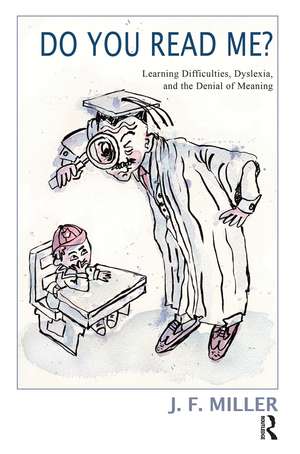Do You Read Me?: Learning Difficulties, Dyslexia and the Denial of Meaning
Autor J.F. Milleren Limba Engleză Hardback – 25 iul 2019
Preț: 815.70 lei
Preț vechi: 953.24 lei
-14% Nou
Puncte Express: 1224
Preț estimativ în valută:
156.08€ • 163.40$ • 129.15£
156.08€ • 163.40$ • 129.15£
Carte tipărită la comandă
Livrare economică 07-21 aprilie
Preluare comenzi: 021 569.72.76
Specificații
ISBN-13: 9780367102463
ISBN-10: 0367102463
Pagini: 294
Dimensiuni: 159 x 235 mm
Greutate: 0.57 kg
Ediția:1
Editura: Taylor & Francis
Colecția Routledge
Locul publicării:Oxford, United Kingdom
ISBN-10: 0367102463
Pagini: 294
Dimensiuni: 159 x 235 mm
Greutate: 0.57 kg
Ediția:1
Editura: Taylor & Francis
Colecția Routledge
Locul publicării:Oxford, United Kingdom
Public țintă
Professional Practice & DevelopmentCuprins
ACKNOWLEDGEMENTS ABOUT THE AUTHOR INTRODUCTION PART I: READING DISABILITY CHAPTER ONE The dyslexia muddle CHAPTER TWO Acronyms, non-science, and nonsense CHAPTER THREE "Those who can't...": the emperor's new clothes CHAPTER FOUR First base CHAPTER FIVE Feeding, reading, and mental anorexia CHAPTER SIX Emotional health and fitness CHAPTER SEVEN Family matters: the inner story CHAPTER EIGHT Family matters: the external situation CHAPTER NINE Secrets, lies, and hidden agenda CHAPTER TEN Autodidacts and the Garden of Eden CHAPTER ELEVEN Go for it! The function of aggression CHAPTER TWELVE Writing: exposure or self-affirmation? CHAPTER THIRTEEN Boring! Attention and interest CHAPTER FOURTEEN What is your story? CHAPTER FIFTEEN Un-ready adults CHAPTER SIXTEEN Dysnumeracy: the "third r" CHAPTER SEVENTEEN Hyperlexia, dysbiblia, and the problem of giftedness PART III: THE EDUCATION ISSUE CHAPTER EIGHTEEN Schooling and education: liberation or persecution? PART IV: DIAGNOSIS FOR REAL UNDERSTANDING CHAPTER NINETEEN Useless intelligence: sensible and nonsensical uses of standardised tests CHAPTER TWENTY How to do assessment and diagnosis: capturing individuality POSTSCRIPT Education in crisis REFERENCES INDEX
Descriere
Based on the author's thirty years' experience of both educational psychology and analytical therapy, the book sets out a radical approach to learning difficulties in which the primary assumption is that there will usually be underlying emotional conflicts, tensions, and anxieties.
